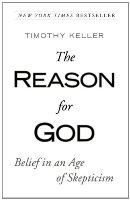About the Author
Timothy Keller is the founding pastor of Redeemer Presbyterian Church in Manhattan. He is the author of numerous books and is Vice-President of the Gospel Coalition.
Overview
As a pastor in Manhattan, Tim Keller has discussed the Christian faith with thousands of skeptics and cynics. This book is shaped by those discussions. It examines the most common objections to the truth of the Christian faith, as well as probing the assumptions that underlie those objections. Believers and unbelievers alike have their faith put on the table for examination.
This book divides into two parts. The first part tackles the reasons people have for rejecting Christianity. In the second part of the book, positive reasons are given for believing in the Christian faith. A case is made for the existence of God, knowing God, the historicity and necessity of the cross and resurrection, and other core elements of Christianity. Keller draws together a number of arguments and clues to form a cumulative case for the truth of Christianity.
Table of Contents
Introduction
Chapter 1: There Can’t Be Just One True Religion
Chapter 2: How Could a Good God Allow Suffering?
Chapter 3: Christianity Is a Straitjacket
Chapter 4: The Church Is Responsible for So Much Injustice
Chapter 5: How Can a Loving God Send People to Hell?
Chapter 6: Science Has Disproved Christianity
Chapter 7: You Can’t Take the Bible Literally
Intermission
Chapter 8: The Clues of God
Chapter 9: The Knowledge of God
Chapter 10: The Problem of Sin
Chapter 11: Religion and the Gospel
Chapter 12: The (True) Story of the Cross
Chapter 13: The Reality of the Resurrection
Chapter 14: The Dance of God
Epilogue: Where Do We Go from Here?
Notes
Index
Chapter 1
There Can’t Be Just One True Religion
One of the most common reasons people in Manhattan give for disbelieving in the Christian message is that it is exclusive. Even though religious leaders recognize that their respective religions make exclusive claims, many people believe that exclusive religious claims guarantee division and violence. Ironically, some of the worst violence in the 20th Century came from governments that were intent on outlawing religion. Rather than destroying religion, however, overt persecution caused it to flourish. Although religion is not outlawed in North America, it is still frequently condemned. It is often objected that religious exclusivism is inherently arrogant, that all religions are equally true or false, that religious beliefs are sociologically conditioned, and that no religion can claim sure knowledge of absolute truth.
What unites these objections is the fact that they all contain a presupposition that…
[To continue reading this summary, please see below....]The remainder of this article is premium content. Become a member to continue reading.
Already have an account? Sign In
